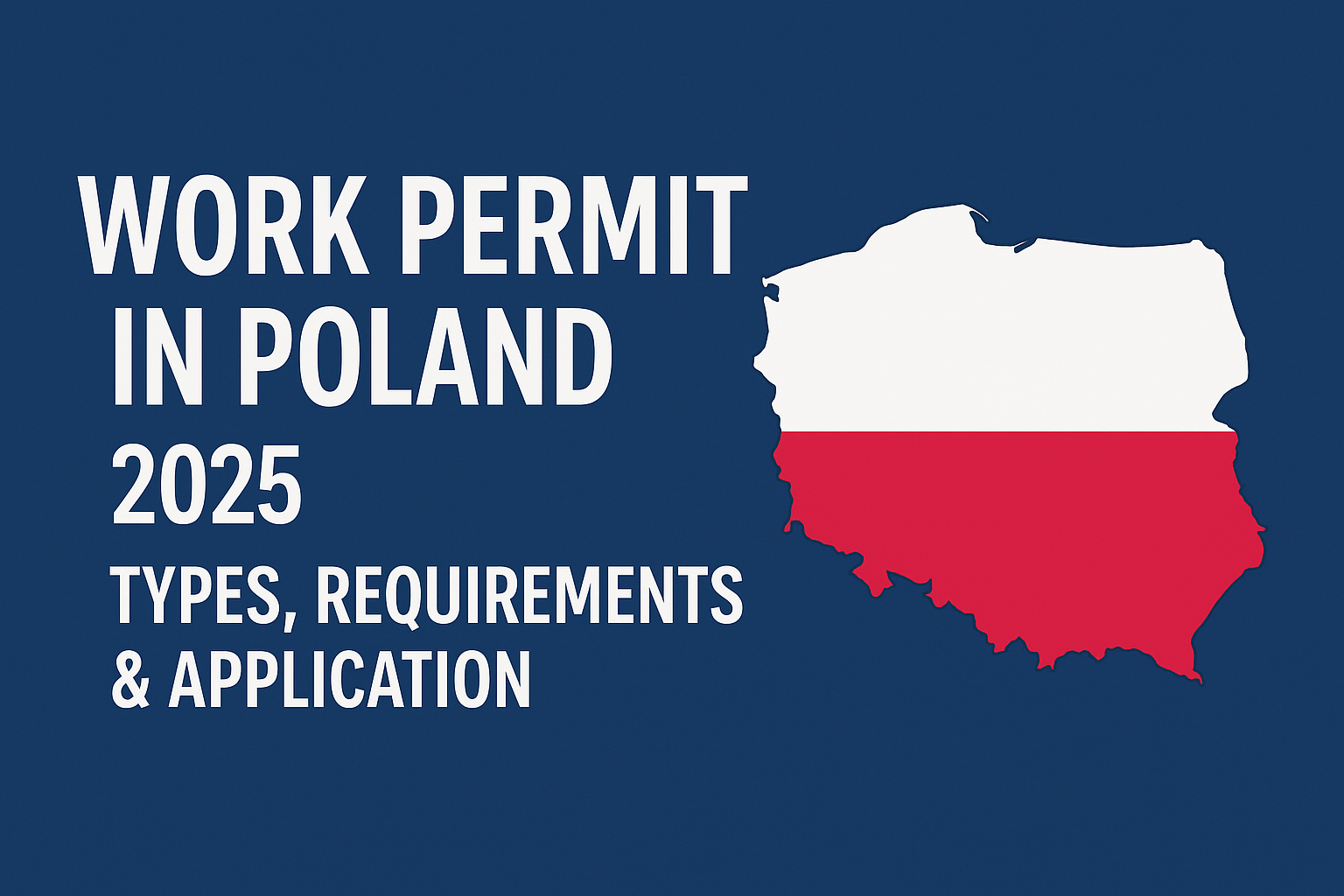Poland has become one of the most attractive destinations for foreign workers in recent years. With its growing economy, strategic location in Europe, and demand for skilled labor, many international professionals and job seekers are exploring opportunities in the Polish job market. However, before starting a job in Poland, most non-EU/EEA citizens need a work permit.
This guide provides everything you need to know about obtaining a Polish work permit, including types of permits, eligibility, requirements, application procedures, validity, and useful tips.
Why Work in Poland?
Before diving into the legal requirements, it’s worth highlighting why Poland is a popular choice among job seekers worldwide:
- Growing Economy – Poland is one of the fastest-growing economies in the EU, with strong industrial, IT, construction, and service sectors.
- Strategic Location – Situated in Central Europe, Poland connects Western and Eastern Europe, making it ideal for international businesses.
- High Demand for Workers – Many Polish companies face labor shortages, especially in construction, healthcare, manufacturing, logistics, and IT.
- Affordable Living Costs – Compared to Western Europe, the cost of living in Poland is more affordable.
- Pathway to EU Residency – Working in Poland can be a stepping stone toward permanent residency or citizenship in the EU.
Do You Need a Work Permit in Poland?
Whether you need a work permit depends on your nationality:
- EU/EEA and Swiss citizens: You do not need a work permit to work in Poland. You can start working freely but may need to register your stay if it exceeds 3 months.
- Non-EU/EEA citizens: Most foreign nationals must obtain a work permit before starting employment in Poland.
Types of Work Permits in Poland
Poland offers several types of work permits depending on your job situation. Choosing the correct type is crucial for legal employment.
1. Work Permit Type A
- Issued when you have a job offer from a Polish employer.
- The employer applies for this permit on your behalf.
- Valid for employment in one specific company.
2. Work Permit Type B
- Required if you are a member of a company’s board of directors and will be in Poland for more than 6 months within 12 consecutive months.
3. Work Permit Type C
- For employees sent to Poland by a foreign employer to work at a branch or subsidiary for more than 30 days.
4. Work Permit Type D
- If a foreign employer sends you to Poland for export services, this permit is necessary.
5. Work Permit Type E
- For foreign nationals sent to Poland for a purpose other than those covered in types B, C, or D.
6. Seasonal Work Permit
- Issued for seasonal jobs such as agriculture, horticulture, or tourism.
- Usually valid for up to 9 months in a calendar year.
Who Can Apply for a Polish Work Permit?
In most cases, the employer applies for the work permit, not the employee. However, the worker must provide all necessary documents to support the application.
General eligibility requirements include:
- A valid job offer from a registered employer in Poland.
- Proof that the employer could not find a suitable Polish or EU candidate.
- The applicant must meet qualification and health requirements for the job.
- A valid passport and no criminal record.
Documents Required for a Work Permit in Poland
To apply for a work permit, the following documents are usually required:
- Completed application form.
- Copy of passport (all pages).
- Recent passport-size photographs.
- Employment contract or job offer letter.
- Details of the company (National Court Register entry).
- Proof of payment of application fees.
- Medical certificate (if required).
- Documents proving qualifications and experience.
Note: Additional documents may be requested depending on the type of permit.
How to Apply for a Work Permit in Poland
The application process involves both the employer and the employee. Below is a step-by-step guide:
1: Job Offer
- Secure a job offer from a Polish employer.
2: Employer Submits Application
- The employer applies for your work permit at the local Voivodeship Office (Urząd Wojewódzki).
3: Labor Market Test (if required)
- In some cases, the employer must prove that no Polish or EU candidate was suitable for the position.
4: Permit Issuance
- If approved, the work permit is issued and linked to your job and employer.
5: Apply for a Work Visa
- With a valid work permit, you can apply for a National Visa (Type D) at the Polish consulate in your country.
6: Arrival in Poland
- Once in Poland, you can legally start working under the conditions specified in your permit.
Processing Time and Validity
- Processing Time: It usually takes 6–12 weeks to process a work permit application, depending on the region and type of permit.
- Validity: Most work permits are valid for up to 3 years. Seasonal permits are valid for up to 9 months.
Work Permit vs. Residence Permit in Poland
A work permit alone does not allow you to live in Poland. To legally stay and work, you may need:
- National Visa (Type D): Allows entry and stay for work.
- Temporary Residence and Work Permit: Combines both work and residence rights, valid for up to 3 years.
If you plan to stay long-term, applying for a residence permit is recommended.
Costs of a Work Permit in Poland
The fees depend on the type of permit:
- Work Permit (up to 3 years): Around PLN 440.
- Seasonal Work Permit: Around PLN 30.
- Temporary Residence and Work Permit: Around PLN 440–490.
Employers usually cover these costs, but it’s best to confirm in advance.
Rights and Limitations of a Work Permit
Rights:
- Legal employment in Poland under the terms of your contract.
- Social security contributions and healthcare access.
- Potential pathway to permanent residency.
Limitations:
- The permit is valid only for the specific employer and position.
- If you change employers, you must apply for a new permit.
- Self-employment requires a different legal setup.
Common Reasons for Work Permit Rejection
Some applications may be rejected due to:
- Incomplete documentation.
- Incorrect or false information.
- Employer not meeting legal obligations.
- Job not matching applicant’s qualifications.
- Criminal record of the applicant.
How to Extend a Work Permit in Poland
If you wish to continue working after your permit expires, you must apply for an extension before the expiry date. The employer should submit the extension application at the Voivodeship Office.
Tips for a Successful Work Permit Application
- Ensure your employer is reliable and registered.
- Prepare all required documents carefully.
- Apply early to avoid delays.
- Keep your passport valid for the entire duration of employment.
- Consider applying for a residence permit if staying long-term.
Final Thoughts
Poland offers excellent opportunities for foreign workers, but understanding the work permit process is essential before starting employment. Whether you’re a skilled professional, seasonal worker, or corporate executive, obtaining the right type of permit ensures your stay and work in Poland are legal and secure.
By following the proper procedures and preparing your documents in advance, you can enjoy a smooth transition into the Polish workforce and take full advantage of the opportunities this growing European economy has to offer.
Read Also:






Leave A Comment